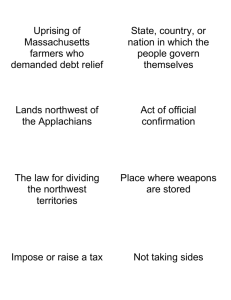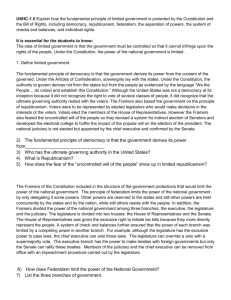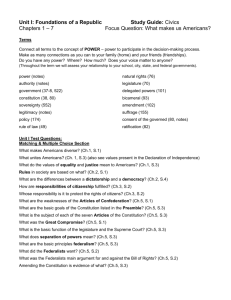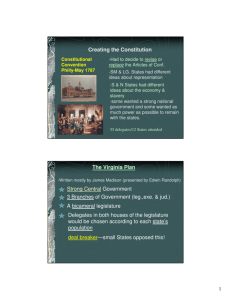this 1825 opinion by Pennsylvania judge John Gibson is so interesting
advertisement
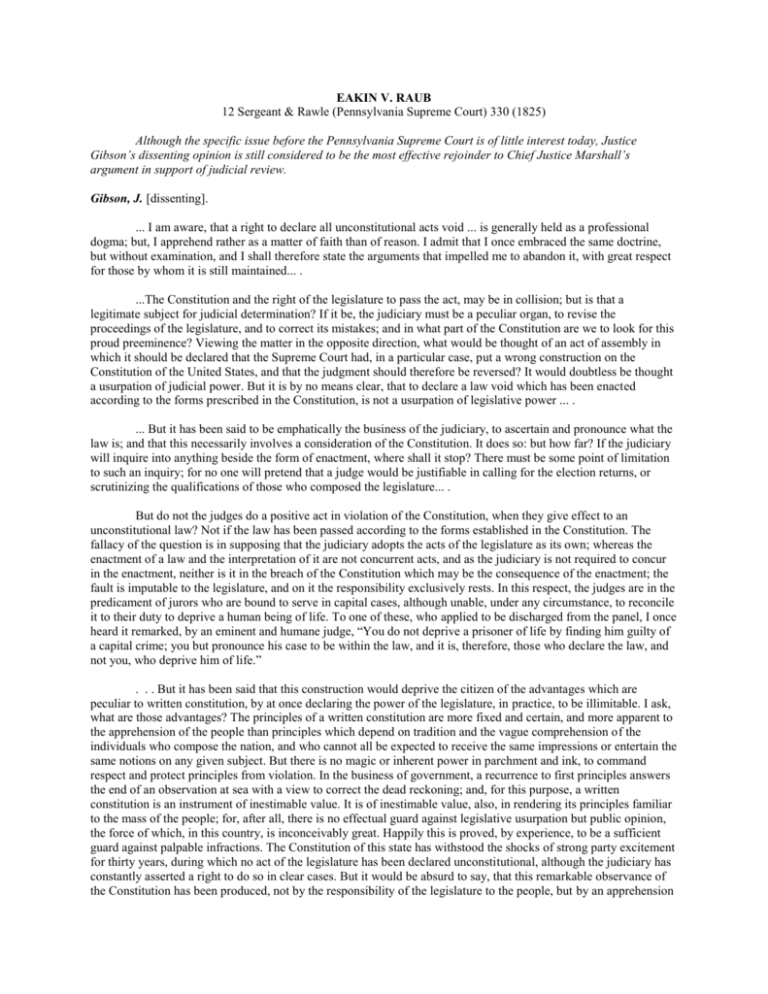
EAKIN V. RAUB 12 Sergeant & Rawle (Pennsylvania Supreme Court) 330 (1825) Although the specific issue before the Pennsylvania Supreme Court is of little interest today, Justice Gibson’s dissenting opinion is still considered to be the most effective rejoinder to Chief Justice Marshall’s argument in support of judicial review. Gibson, J. [dissenting]. ... I am aware, that a right to declare all unconstitutional acts void ... is generally held as a professional dogma; but, I apprehend rather as a matter of faith than of reason. I admit that I once embraced the same doctrine, but without examination, and I shall therefore state the arguments that impelled me to abandon it, with great respect for those by whom it is still maintained... . ...The Constitution and the right of the legislature to pass the act, may be in collision; but is that a legitimate subject for judicial determination? If it be, the judiciary must be a peculiar organ, to revise the proceedings of the legislature, and to correct its mistakes; and in what part of the Constitution are we to look for this proud preeminence? Viewing the matter in the opposite direction, what would be thought of an act of assembly in which it should be declared that the Supreme Court had, in a particular case, put a wrong construction on the Constitution of the United States, and that the judgment should therefore be reversed? It would doubtless be thought a usurpation of judicial power. But it is by no means clear, that to declare a law void which has been enacted according to the forms prescribed in the Constitution, is not a usurpation of legislative power ... . ... But it has been said to be emphatically the business of the judiciary, to ascertain and pronounce what the law is; and that this necessarily involves a consideration of the Constitution. It does so: but how far? If the judiciary will inquire into anything beside the form of enactment, where shall it stop? There must be some point of limitation to such an inquiry; for no one will pretend that a judge would be justifiable in calling for the election returns, or scrutinizing the qualifications of those who composed the legislature... . But do not the judges do a positive act in violation of the Constitution, when they give effect to an unconstitutional law? Not if the law has been passed according to the forms established in the Constitution. The fallacy of the question is in supposing that the judiciary adopts the acts of the legislature as its own; whereas the enactment of a law and the interpretation of it are not concurrent acts, and as the judiciary is not required to concur in the enactment, neither is it in the breach of the Constitution which may be the consequence of the enactment; the fault is imputable to the legislature, and on it the responsibility exclusively rests. In this respect, the judges are in the predicament of jurors who are bound to serve in capital cases, although unable, under any circumstance, to reconcile it to their duty to deprive a human being of life. To one of these, who applied to be discharged from the panel, I once heard it remarked, by an eminent and humane judge, “You do not deprive a prisoner of life by finding him guilty of a capital crime; you but pronounce his case to be within the law, and it is, therefore, those who declare the law, and not you, who deprive him of life.” . . . But it has been said that this construction would deprive the citizen of the advantages which are peculiar to written constitution, by at once declaring the power of the legislature, in practice, to be illimitable. I ask, what are those advantages? The principles of a written constitution are more fixed and certain, and more apparent to the apprehension of the people than principles which depend on tradition and the vague comprehension of the individuals who compose the nation, and who cannot all be expected to receive the same impressions or entertain the same notions on any given subject. But there is no magic or inherent power in parchment and ink, to command respect and protect principles from violation. In the business of government, a recurrence to first principles answers the end of an observation at sea with a view to correct the dead reckoning; and, for this purpose, a written constitution is an instrument of inestimable value. It is of inestimable value, also, in rendering its principles familiar to the mass of the people; for, after all, there is no effectual guard against legislative usurpation but public opinion, the force of which, in this country, is inconceivably great. Happily this is proved, by experience, to be a sufficient guard against palpable infractions. The Constitution of this state has withstood the shocks of strong party excitement for thirty years, during which no act of the legislature has been declared unconstitutional, although the judiciary has constantly asserted a right to do so in clear cases. But it would be absurd to say, that this remarkable observance of the Constitution has been produced, not by the responsibility of the legislature to the people, but by an apprehension of control by the judiciary. Once let public opinion be so corrupt as to sanction every misconstruction of the constitution and abuse of power which the temptation of the moment may dictate, and the party which may happen to be predominant, will laugh at the puny effort of a dependent power to arrest it in its course. For these reasons, I am of the opinion that it rests with the people, in whom full and absolute sovereign power resides to correct abuses in legislation, by instructing their representatives to repeal the obnoxious act. What is wanting to plenary power in the government, is reserved by the people for their own immediate use; and to redress an infringement of their rights in this respect, would seem to be an accessory of the power thus reserved. It might, perhaps, have been better to vest the power in the judiciary; as it might be expected that its habits of deliberation, and the aid derived from the arguments of counsel, would more frequently lead to accurate conclusions. On the other hand, the judiciary is not infallible; and an error by it would admit of no remedy but a more distinct expression of the public will, through the extraordinary medium of a convention; whereas, an error by the legislature admits of a remedy by an exertion of the same will, in the ordinary exercise of the right of suffrage—-a mode better calculated to attain the end, without popular excitement. It may be said, the people would probably not notice an error of their representatives. But they would as probably do so, as notice an error of the judiciary; and, beside, it is a postulate in the theory of our government, and the very basis of the superstructure, that the people are wise, virtuous, and competent to manage their own affairs; and if they are not so, in fact, still every question of this sort must be determined according to the principles of the Constitution, as it came from the hands of its framers, and the existence of a defect which was not foreseen, would not justify those who administer the government, in applying a corrective in practice, which can be provided only by a convention... .



